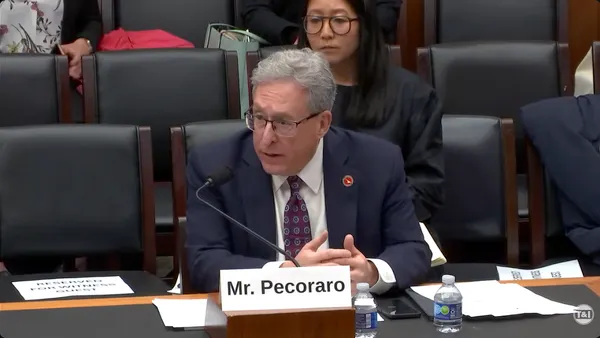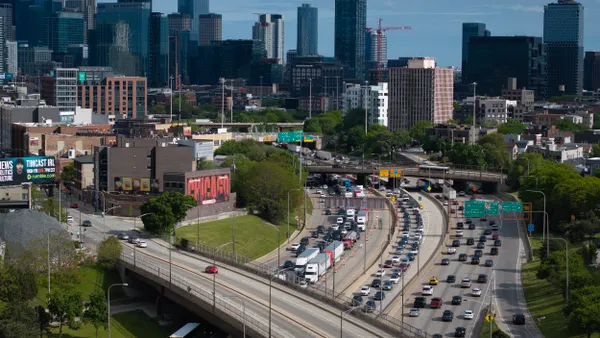The fiscal year 2020 Transportation-Housing and Urban Development (THUD) bill, providing $137.1 billion in resources, was approved by the U.S. House of Representatives on Tuesday.
The legislation provides $13.5 billion in funding to public transit and billions more for infrastructure and railroad improvements. American Public Transportation Association (APTA) President and CEO Paul Skoutelas celebrated the approval in a statement, noting the legislation "represents a commitment by lawmakers to our growing communities, supporting jobs, and providing expanding mobility options."
The proposed THUD funding amount is higher than last year, APTA Vice President of Government Affairs Ward McCarragher told Smart Cities Dive. The projected budget is $6 billion more than the 2019 level, and $17.3 billion more than the president's 2020 budget request.
The steady growth in funding remains in lock-step with the use of public transit, increasing by 21% since 1997.
"The critical additional amount of investment is really helping transit agencies, commuter rail and intercity passenger rail move forward with important projects," McCarragher said.
Smart Cities Dive identified three trends for cities to prepare for among the public transit investments.
1. Reduced growing pains
Public transit has experienced growth over the two last two decades. The total miles traveled by passengers has grown from 42.4 billion miles in 1997 to 57 billion miles in 2017. Rail ridership has also grown by 60% as the population has grown 19%.
This growth has put new strains on public transit systems. The funding will help cities address those strains by investing in "bread and butter" issues like core capacity, and providing more transportation choices and mobility options, McCarragher said.
For instance, public transit has generally become more handicap-accessible, which this funding can further expand.
The Bay Area Rapid Transit (BART) system has experienced a major increase in ridership over the past decade between San Francisco and Oakland, CA. To help curb the congestion, the $300 million "Trans Bay Corridor Core Capacity Project" was recently created to increase train frequencies from Oakland to San Francisco by more than 30% (running 30 trains per hour compared to 23).
Cities can look to systems like BART as case studies for how to best expand rider capacity.
2. New tech and innovations
Funding will allow cities to continue growing their technology capabilities, including real-time public transit tracking services. Other tech innovations include integrated fare payment systems that provide riders with just one system to pay for multiple modes of transportation, according to McCarragher.
Innovation can also occur in the form of supported partnerships. Washington, DC's Metro service just announced a partnership with Lyft for late-night commuters starting July 1.
The "After-Hours Commuter Service" will provide late-night workers in industries like hospitality and health care with a three-dollar subsidy towards a shared Lyft ride for trips taken between their home and workplace.
3. Increased equity initiatives
Funding can also enable cities to put a greater focus on equity initiatives. Some of those initiatives include expanding and redesigning bus services or maintaining affordable housing near public transit, according to McCarragher.
Cities have long been grappling with transportation inequities like the "pink tax" paid by women who avoid public transit at night; a lack of dockless vehicle access in low-income neighborhoods; and the income and education disparity among ride-share passengers.
Public transit investments can help curb these inequities, but cities must be strategic in how to best allocate funding for initiatives.
"What's more important, having [a less reliable bus] within a block of your house or having it within three blocks, but coming every 15 minutes instead?" McCarragher said.
CLARIFICATION: The following statement was updated by APTA Vice President of Government Affairs to clarify that he's comparing the 2020 THUD budget to last year's budget: "The proposed THUD funding amount is higher than last year, APTA Vice President of Government Affairs Ward McCarragher told Smart Cities Dive."











